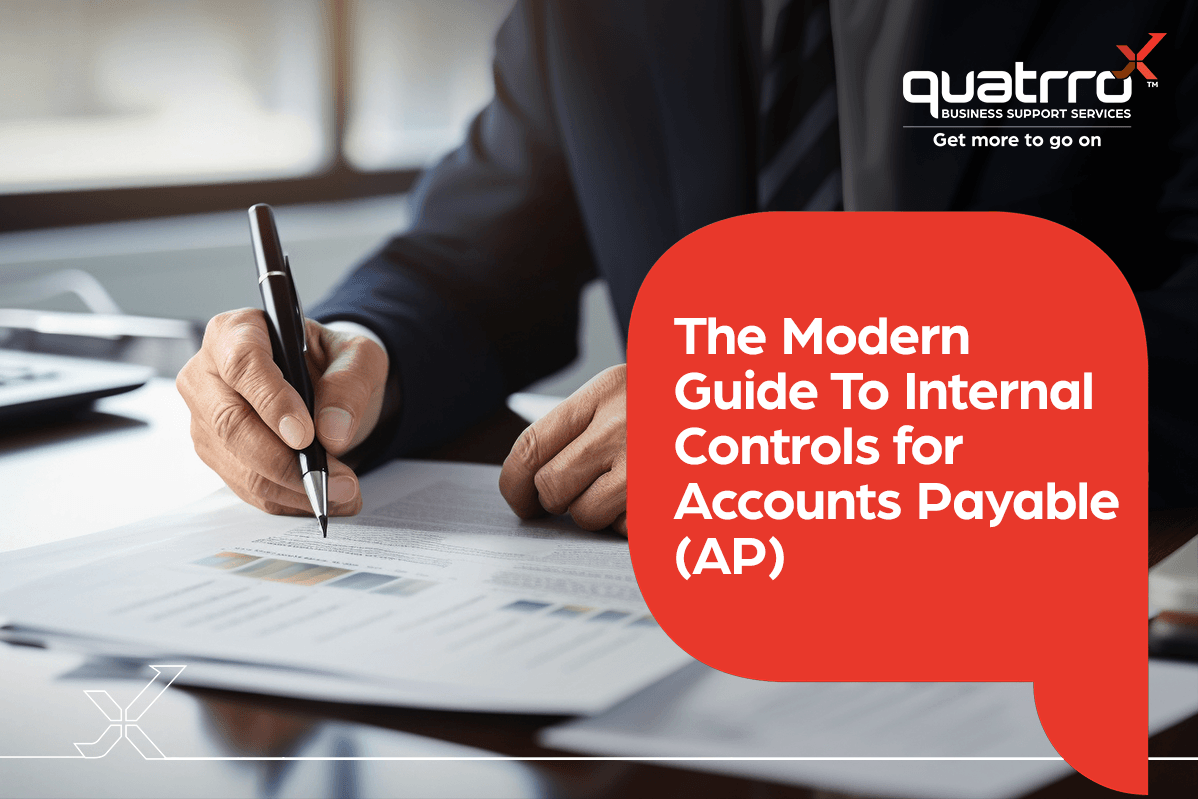Blog Details
The Modern Guide To Internal Controls for Accounts Payable (AP)
July 2, 2024

Has your business implemented proper internal controls into its accounting process? If not, you may be opening yourself up to significant financial risk — a lack of internal controls contributes to around one third of losses from business fraud. Proper internal controls for accounts payable (AP) ensure that every outgoing payment is justified, authorized, and properly recorded, which protects the company from financial errors and fraud.
Many accounts payable internal controls can be automated, so that your business will always have a second layer of security protecting its finances. An effective internal controls framework can keep everything running smoothly and give you valuable insights for better decision-making.
What Are Accounts Payable Internal Controls?
Accounts payable internal controls are rules and checks that businesses set up to manage their outgoing payments effectively. This helps businesses avoid mistakes like paying too much, paying the wrong person, or paying twice. A good accounts payable workflow will have three main steps where internal controls will verify that everything is processed correctly:
- Obligation to Pay: Before any money leaves the company, you have to confirm that the payment actually needs to be made. This means checking if the goods or services were ever actually ordered, whether they were received and if they meet the previously agreed-upon terms.
- Data Entry into the System: Once it’s clear that a payment should be made, the details need to be correctly entered into the company’s financial system. This step keeps track of what’s going out and ensures everything is recorded properly.
- Payment of the Debt: The final step is the actual payment of the debt. This is when the company sends money to pay for the goods or services. Doing this correctly and on time helps maintain good relationships with suppliers.
Why Do You Need Internal AP Controls?
Internal controls are a must for any company that wants to manage its accounts payable properly and not open itself up to risk. Internal controls are good for all parties involved — they safeguard the company’s finances, ensure everything runs smoothly, and maintain good relationships with suppliers and vendors.
Minimizing Internal Fraud Risks
One of the primary reasons for implementing strong internal controls in accounts payable is to minimize the risk of fraud. In any business, the opportunity for fraud in financial transactions can be significant, especially where oversight is lacking. For example, without adequate controls, it’s possible for an employee to create fake vendor accounts and approve payments to these accounts, siphoning off funds undetected. Effective internal controls, such as requiring multiple approvals for transactions above a certain threshold and regularly auditing vendor lists, help prevent such fraudulent activities by adding layers of scrutiny and accountability.
Mitigating Financial Risks
Besides preventing internal fraud, internal controls help mitigate other financial risks. These include risks like paying incorrect amounts or paying for undelivered services. With strict controls, such as three-way or four-way matching, the company can ensure that payments are only made after verifying that the amounts are correct and the goods or services have been received as expected. This process involves checking the purchase order, the receiving report, and the invoice to confirm that everything lines up. Such measures protect the company from financial losses due to errors or oversight.
Ensuring Accuracy and Compliance
Accuracy in financial transactions and compliance with laws and regulations are non-negotiable for any business. Internal controls in accounts payable ensure that all financial records are accurate and that the company complies with applicable financial regulations.
Enhancing Supplier Relationships
Strong relationships with suppliers can be vital to a business’s success. Timely and accurate payments contribute significantly to maintaining good relationships. Internal controls help ensure that payments are processed on time and that errors that could strain these relationships are minimized.
Being Audit Ready
Robust internal controls streamline the audit process. When an external auditor assesses a company’s financial transactions, having a clear, well-documented trail of every transaction makes their job easier. This reduces the time and cost associated with audits and the stress on the company during audit periods. Regular reconciliations and documented approvals help ensure that all transactions are accounted for and that the financial records reflect the true state of the accounts payable.
Obligation to Pay Controls
The first line of defense in AP internal controls revolves around establishing the obligation to pay. These controls verify that any money the company spends is both necessary and correctly accounted for. Before any payment is processed, it’s crucial to confirm that the company genuinely owes the debt under the terms agreed upon.
Purchase Order Approval
To prevent unauthorized spending and fraud, companies implement controls that require expenditures to be approved by designated personnel. This step typically depends on the expenditure amount, with larger amounts requiring higher-level approval.
Purchase order approval ensures that expenditures are anticipated and budgeted before any commitment is made to a vendor. A controlled purchase ordering process requires that all purchase orders are generated and approved within the procurement department before an order is placed with a vendor. This control ensures that all expenditures are pre-approved and appropriately documented.
Invoice Verification
Before processing a payment, the AP department must ensure that the invoice received is legitimate and accurate. This includes verifying that the invoice details (such as amount, vendor information, and terms) match the corresponding purchase order and goods receipt note.
Many companies use automated systems that route invoices to the appropriate approvers based on pre-defined rules. This might include limits based on dollar amounts or specific vendor relationships, ensuring that invoices are reviewed by personnel with the correct authority and knowledge.
In cases where an invoice does not match pre-set criteria (for example, if the amount exceeds a certain threshold or if it doesn’t align with the purchase order), it is escalated to a higher authority. This adds an additional layer of scrutiny that helps prevent mistakes or fraud.
Three-way and Four-way Matching
Three-way and four-way matching are sophisticated verification processes that further secure the payment process.
- Three-way Matching: This process matches the purchase order, the invoice, and the receiving report before payment is processed. It ensures that the payment is legitimate, that the goods or services were ordered and delivered as per the agreement, and that the invoice should be paid.
- Four-way Matching: This includes all the steps in three-way matching but adds an inspection report as a fourth component. This is especially useful in industries where quality and compliance are crucial. It ensures that the goods received, inspected and met the required standards before payment is released.
Auditing for Duplicates
To prevent paying the same invoice twice, rigorous controls are necessary to identify and stop duplicate payments.
Many modern AP systems include tools that automatically check for duplicate invoices. These systems review key invoice details such as invoice number, vendor details, and amount and alert the AP team if a potential duplicate is detected.
In addition to automated checks, periodic manual reviews help catch duplicates that might not be identified by automated systems, particularly if there are slight variations in the invoice presentation or details.
Data Entry Controls
There are two primary methods of recording invoices: before and after approval, each with its own set of procedures, advantages, and inherent risks.
Record Before Approval
The method of recording invoices before approval involves entering the invoice details into the AP system as soon as it is received, even before any approvals are completed.
The primary advantage of recording invoices before they are approved is the efficiency it brings to the payment process. This method significantly speeds up the entire accounts payable cycle by removing initial waiting periods that might occur if approvals are required before entry. It helps in reducing the backlog of unprocessed invoices. This can be particularly beneficial in high-volume transaction environments where delays can lead to bottlenecks.
Since the invoices are entered into the system before being approved, there might be less control over verifying the authenticity and accuracy of the information provided. This could lead to situations where payments are made on incorrect, duplicate, or fraudulent invoices.
Record After Approval
Recording an invoice after approval means that the invoice details are only entered into the AP system once they have been thoroughly checked and approved. This method prioritizes control and accuracy over speed by ensuring that every invoice undergoes a detailed review and approval process before it impacts the financial records.
The most significant advantage of this approach is the enhanced control it offers over the accounts payable process and the reduced risk of fraud. Since every invoice is scrutinized for accuracy and legitimacy before entry, there is a lower chance of errors and fraudulent activities slipping through the cracks.
Payment Entry Controls
Segregation of Duties
Segregation of duties is a fundamental control mechanism that involves dividing responsibilities among different individuals or departments to ensure no single person has control over all aspects of a financial transaction. This separation reduces the risks of errors and fraud by requiring more than one person to complete parts of a task. For example, one person might handle invoice processing while another manages the disbursements.
To implement segregation of duties effectively, identify key processes and tasks within the payment cycle that can be divided among staff. Then, assign responsibilities so that no one individual handles multiple stages of a transaction that could lead to misappropriation of funds.
Track Check Numbers
Tracking check numbers is important for maintaining control over the payment process and preventing fraud. By keeping a detailed record of all check numbers issued, companies can quickly identify and address discrepancies such as missing checks or unauthorized transactions.
Manual Check Signing and Double Signing
Manually signing checks is a control practice that involves a responsible party physically signing off on a check as a final review before it is issued. This step can be especially important in large transactions because it provides an opportunity for the signer to verify the accuracy and legitimacy of the payment one last time. In these scenarios, it is key that the signer has access to all necessary documentation (invoice, purchase order, approval documentation) to verify the correctness of the payment.
Double signing is a practice where checks, especially those above a certain threshold amount, require signatures from two authorized individuals. This practice adds an additional layer of security for significant transactions.
Secure Check Storage
Secure storage of checks is vital for preventing theft, fraud, and unauthorized use. Remember, checks can be a direct line to your company’s bank accounts, and the prevalence of check fraud is only rising. Use a safe or a locked drawer with limited access to store blank checks and signed checks awaiting dispatch.
Improving Internal Controls Within Your Company
The first step to improving your internal controls is to evaluate your current system critically, paying special attention to any areas where problems have appeared in the past. For instance, if an evaluation reveals that unauthorized changes to vendor payment details are a recurring issue, the company might consider implementing stronger verification processes for any changes to vendor accounts.
After identifying areas for improvement, the next step is to enhance the controls. This might involve introducing additional checks and balances, increasing the frequency of audits, or implementing new technology solutions that provide better oversight and security.
AP Automation Software
One effective way to enhance internal controls is by implementing accounts payable automation software. This software can automate many of the manual tasks involved in processing payments, such as data entry, invoice matching, and approvals routing. Automation reduces the likelihood of human error and speeds up the processing time. Modern AP automation software usually includes features that help enforce internal controls, such as electronic approvals, which can be tracked and audited much more easily than manual processes.
Use workflow best practices in any AP automation software you choose. This means setting up the software to reflect your company’s specific control requirements, such as ensuring that invoices above a certain amount go through additional layers of approval or that all invoices are matched with corresponding purchase orders and receiving reports before payment is approved.
Data in Accounts Payable — Get More To Go On
Effective internal controls in accounts payable are essential for ensuring the accuracy and reliability of financial data. This is crucial for preventing fraud, maintaining compliance and for generating accurate forecasts and informing strategic business decisions. Integrating strong internal controls with sophisticated data analytics transforms routine financial transactions into valuable insights, enabling companies to optimize their workflows, improve vendor relationships, and enhance overall financial health.
When companies implement robust accounts payable systems that prioritize both security and data analysis, they unlock a wealth of information that can lead to significant improvements in efficiency, profitability, and cost management. At Quatrro, we support this optimization by offering advanced solutions that reinforce internal controls and help expand the analytical capabilities of accounts payable departments. See how Quatrro can help transform your business today!








